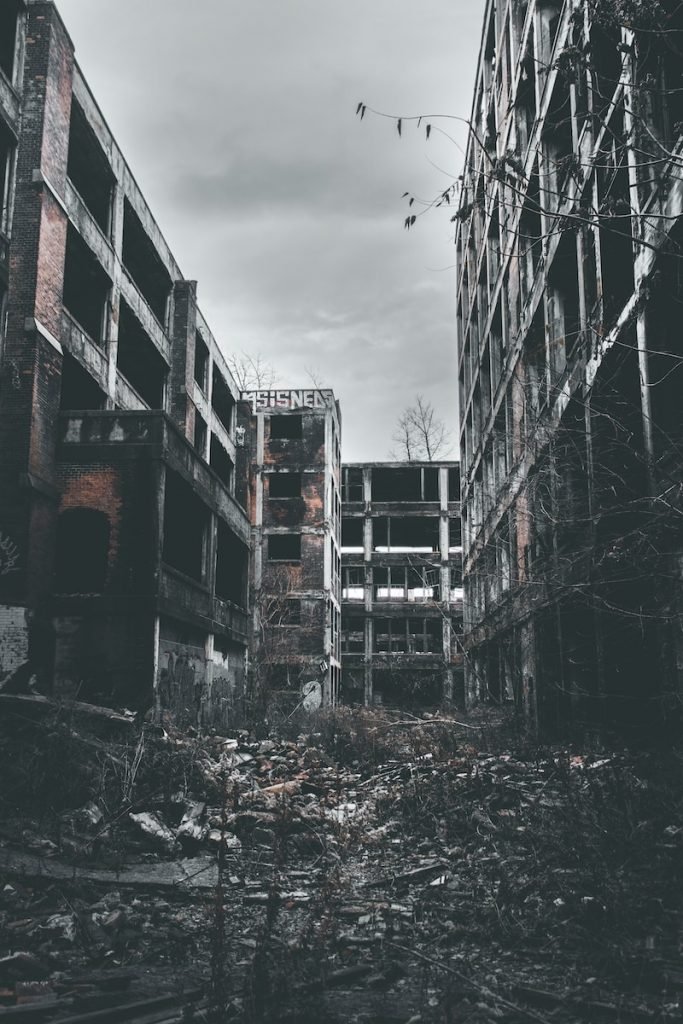“We are addicted to the noise of things falling apart.” – Mark Nepo
We must marshal our best thinking, talent, and energy to imagine the institutions of the future; nothing less than the continued progress of the human race is at stake….We have a tremendous opportunity to reimagine the kind of society we want to live in and bring it into being….grasp the moment that is already presented to us, so that we might lead each other toward a better, more humane, more progressive world….Having the collective determination and strength of mind to steer it where we want. Instead of lamenting the death of something…we can learn to celebrate the creation of a radical new way of organizing the world, taking steps to align it with democratic values and with our need for social order. (Mele, 2013, pp. 31-32, 252-253)

Institutions Failing
Maybe you’ll agree we’ve got problems, but you may believe they aren’t as dire or as impending as I see them to be. Certainly the majority of North Americans either (a) haven’t allowed themselves to notice or take seriously the pending crises or (b) feel they can do little about it. Still, bad news sells, and we keep talking about problems in the hope that someone else will do something about them.
Julian Assange’s point way back in the day when Wikileaks came out, that bureaucracies are already dead, because to the degree that they are subject to negative risk from leaks, they basically have two choices, or three: they can either just take it on the chin, and then ultimately loose….They can endeavor to constrain leaks, which means significantly increasing the internal policing, or they can radically reduce the amount of communication they engage in. In any of those three cases, they’re shrinking their sphere of operations that matter. (Rebel Wisdom, 2019, 26:41)
As North America has lessened its attachment to organized religion, and other time-honored institutions seem to be failing in their traditional roles, tribe and community has been and is being redefined. Nicco Mele, author of The End of Big, is a past Director of the Shorenstein Center on Media, Politics, and Public Policy, an academic research center in the Harvard Kennedy School that examines media policy and innovation. He has this to say about institutions breaking down:
Our government, locked in a partisan gridlock, has moved toward a perilous combination of bankruptcy and irrelevance….We face a monumental task helping our institutions recover from their failings so that they can serve their core purposes once again. (Mele, 2013, pp. 252-253)
Jordan Hall (2017) talks about a kind of narrative and ideology control structure that is a natural result of mass media. It is an evolved, rather than designed, function that has been an effective political and dominant cultural force in the United States. It has been supporting up “the establishment” on both sides. The main mechanism of control of public opinion is that when enough people are coherent around an expert-defined opinion, natural social dynamics will maintain that coherence. However, Hall asserts in the context of ecological degradation, changing forms of information consumption, and global politics, the former public opinion corralling mechanism “is simply in way over its head. The world is just too big and moving too fast for this kind of control hierarchy to keep up” (Sec. The End is Nigh, para. 8).
Don’t imagine that our world can’t collapse: there is nothing inevitable about progress or peace, and the global and national social and political order we inhabit today is no more immune from catastrophe than the pre World War II order. and perhaps it will take another catastrophe to jolt us into designing new rules and institutions better suited to 21st century challenges. But maybe—if we are honest enough to acknowledge the growing incoherence of the all too human rules and institutions we have created, and brave enough to imagine new ones—we can find a path that will lead us, if not toward peace, then at least toward something kinder than perpetual war. (Brooks, 2016, p. 36)
I was speaking to an audience of majors and Lieutenant colonels… the school takes only those viewed as the army’s best and brightest: creative officers likely to serve as important leadership positions throughout their careers. Most of the officers I spoke to had recently returned from deployments in Iraq and Afghanistan, and I asked them two questions: first, what did they see as the most significant security threats facing the United states in the coming decade or two….al Qaeda ? no hands went up. Islamic terrorism? One or two hands, but mostly head shakes. North Korea and Iran generated no raised hands. Weapons of mass destruction? A few hands went up. New conflicts and resource scarcity driven by climate change? A lot of hands went up. global economic collapse? Here too, lots of hands went up. (Brooks, 2016, p. 259)
Collapse Scenarios
One path leads to despair and utter hopelessness. The other, to total extinction. Let us pray we have the wisdom to choose correctly. –Woody Allen
Outrage and disillusionment has been prevalent in our media feeds. Many in the counter culture point to apocalyptic scenarios that only a decade ago were seen as alarmist. Societal collapse is no longer a concern only of a fringe of paranoid preppers. Scads of Youtube videos show underground doomsday bunkers of billionaires. Diamond (2011), Orlov (2013), and Motesharrei (2014) draw parallels between social and ecological challenges we are facing in our world today with many civilizations in the past which did collapse either economically or culturally, concluding that collapse is part of a natural cycle.

Ord (2020) similarly warns:
Humanity lacks the maturity, coordination, and foresight necessary to avoid making mistakes from which we can never recover. As the gap between our power and our wisdom grows, our future is subject to an ever-increasing level of risk….It is only in the past century that humanity’s power to threaten its entire future became apparent. (pp. 3-4)
Altho for many the push for global industrialization is for monetary gain, they manage to convince many that we need to help the so-called third world to reach a better standard of living. Globalization is a dead end, because “if we decide in the name of fairness to try to industrialize the entire world, the result will be universal starvation, universal famine. Ecosystems will collapse, and we will ultimately see the end of our species” (Local Futures, 2021, 19:46). As we face the population growth and unsustainable food production discussed in Civilization’s Discontents and Cultural Evolution, we find our institutions are increasingly ill-equipped to implement workable solutions.
Collapse is silent. When collapses occur more slowly, it is even more difficult to find anyone acknowledging the process at all. This was true of the late Roman Empire, where one finds letters exchanged between patricians complaining that the roads were often unsafe this time of year, but little acknowledgement of the fundamental changes taking place. (Burja, 2020, p. 163)
Charles Eisenstein shares the apathy that sometimes touches us when we face the enormity of our challenges, but also has hope.
For a lot of lot of people there’s this lingering sense of futility that no matter how much work I do in my little realm, what does it matter when the whole system is careening toward catastrophe? Well the reason that the system is careening towards catastrophe is that this healing on a mass level has not happened, so I want to just liberate, to offer permission in a sense, and to myself too. The reason I’m so familiar with that voice of futility is that it’s speaking to me every day, so I want to liberate that and put it into a bigger picture of global revolution …. It’s not too late right now. (Rebel Wisdom, 2020, 1:02:34)
Resource: Sam Harris podcast #220 on “Deep fakes” and the breakdown of the information ecosystem
The Opportunity

Check for current online events thru The Context Institute.
Robert Gilman explains a cultural shift of humanity from the tribal era, to the agricultural era (which he also describes as the age of empire, which is ending). We are entering the planetary era. The dominator functions are breaking down and “self-organized consensual collaboration” will increasingly become the norm if we survive the transition. “Choice destroys the power of coercion. You can’t have a violence-enforced hierarchy when people can choose to walk away” (Context Institute, 2014, 14:45).
One does not discover new lands without consenting to lose sight of the shore for a very long time. –Andre Gide
Burja (2020) studied the decline of civilizations and especially the attempts to reverse engineer societal stability of past dynasties. He noted the contribution of various ancient texts that were used to support new systems that were practical for their time. He writes, “This collective fruit provides the greatest lesson for those studying social technology: The loss of this knowledge is common, but a permanent loss is rare. All that is needed is the right ruler or thinker for society to learn it anew” (p. 182).
Schmachtenberger (2018) explained that because technology at this point is so powerful that we all can be easily demolished—if not by war then by excessive extraction and pollution from our economic competition—so the only way for the human race to survive is to adopt a stance of personal and collective non rivalry. Ray Dalio agrees if we, especially Americans, decide to “earn more than we spend, and treat each other well” (Dalio, n.d., 41:15) we may delay or reverse the decline that has the typical hallmarks of the end of an empire.

Surrender
Obviously, we all won’t have the same idea of how to use this opportunity, how to engineer the new culture and governance constructs. That’s obvious about the occupy movement and similar efforts: we can’t organize around a central leader or vision because part of the impetus is to shake off central control. Also, a central leader could be seen as a threat to the “powers that be.” Those of us looking at this as opportunity rather than disaster will have the work of helping others see that we’re not being plunged into another dark ages. It may feel like anarchy but there is a subtler order in the seeming chaos. We’re getting the type of pressure that will motivate us to unite.
It is uniting to be going through it together, but only if we communicate well. It’s just, you can choose. Are you gonna let it rip you apart and divide you, or are you going to let yourself be transformed by relaxing control? (23:50)….big wave surfing, and one of the things she talks about is these guys who surf hundred foot waves, just unimaginable power. When they get dumped into a wave, I mean it’s not normal. Like it’s going to flat out kill you if you’re not superhuman, and these guys pretty much are. The first thing they do when they get dumped and they’re however many 100 feet underwater with all this commotion around them, is they relax completely. They slow their heart beats and the whole time they’re being tossed around like rag dolls. They don’t even try to resist; that’s the way to get hurt. So they just get really calm and relaxed because they know eventually the turbulence of the water is going to spit them out somewhere. If it spits them out underwater before they get a chance to take a breath, hmm, they’ll die. But that’s the bet they take, but they have almost a reverent relationship with this experience because they really are coming that close to death and at that moment the challenge is to give up control….The way to the awakened state in the brain is to give up sense of self and give up sense of control, so you surrender to the chaos. You get the terrible diagnosis, you surrender to what happens next. (Beck, 2021, 17:06)
References
References include several direct links to videos.